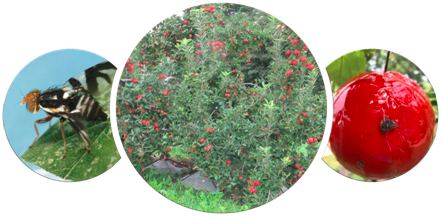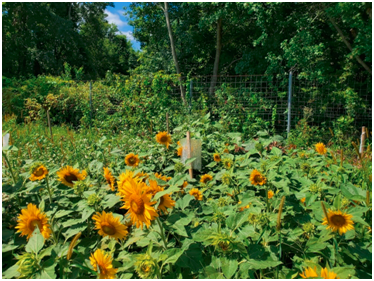How to Enroll in an Online Class
Instructor: Dr. Jaime Pinero, jpinero@umass.edu , (413) 545-1031
https://stockbridge.cns.umass.edu/jaime-pinero

Research interests: Integrated Pest Management, Insect Sensory Ecology (focus: vision and olfaction), Insect-Plant Interactions, Insect Behavior, Biological Control
Class Description
In this course, students will learn the basics of insect identification and classification, with emphasis on those insect groups important to agriculture. Students will understand that insects are crucial components of many ecosystems, where they perform many important functions. For example, insects are directly beneficial to humans by producing honey, silk, wax, and other products. Indirectly, they are important as pollinators of crops, natural enemies of pests, scavengers, and food for other creatures. Insects can also be major pests because they destroy crops and vector diseases. Students will also learn aspects of insect biology, anatomy, and physiology with emphasis on insect systems that make them vulnerable to control.
Course Objectives
- Recognize the importance of insects and the role they play in ecosystems and in human societies
- Learn about the biology and management options for pest arthropods
- Understand the importance of integrated pest management as an ecologically-based set of strategies that support sustainable agriculture
- Identify the components of a state-of-the art IPM program including biological control,behavioral control,physical and cultural control,host plant resistance
- Understand the importance of ecologically-based IPM and conservation of pollinators and other beneficial organisms

Course Format
The course will be offered online through PowerPoint presentations, videos, and online discussions.
Course Requirements
Readings. There is no assigned text for this course.For reading assignments and discussion sessions, PDF copies of articles will be provided. All lectures will be made available in PDF in advance of each class.
Weekly Content
Week 1: Introduction and basic concepts
- Importance of Insects
- Arthropod Diversity and Insect Classification
Week 2: Insect systems
- Integument/Digestive Systems
- Respiratory/Circulatory Systems
- Nervous/Reproduction Systems
Week 3: Important Insect Orders
- I: Zygentoma, Dermaptera, Orthoptera, Mantodea
- II: Blattodea, Psocodea, Thysanoptera, Hemiptera
Week 4: Important Insect Orders [continued]
- III: Neuroptera, Coleoptera, Diptera
- IV: Siphonaptera, Lepidoptera, Hymenoptera
Week 5: Life Cycles and Development
- Ametabolous, hemi-metabolous, and holo-metabolous insects
- Degree day models
- MID-TEM EXAM I
Week 6: Insect Sensory Systems and Behavior
- Visual and chemical ecology
- Attract-and-kill systems
Week 7: Pests and their Impacts
- What is a pest?
- Pest categories
- Agricultural entomology
- Careers in entomology (pest management)
Week 8: Ecosystem Biodiversity and Insect Ecology
- Basic versus applied ecology
- Insect-based ecosystem services
Week 9: Integrated Pest Management: Basic Concepts
- Insect identification
- Monitoring techniques
- Pest management decisions: economic thresholds
- Discussion I
Week 10: Cultural and biological control
- Trap cropping systems, sanitation, and other cultural practices
- Classical, conservation, and augmentation biological control
- Promoting natural enemies on farm
- Biological control in organic farms
- MID-TEM EXAM II
Week 11: Insecticides and their Impact
- Synthetic insecticides
- Biopesticides
- Organically-approved materials
Week 12: Farmscaping, IPM, and Native Pollinator Conservation
- Habitat manipulation
- Insectary plants

Week 13: Invasive species
- Agricultural invasives
- Forest invasives
- Landscape invasives
- Invasives of medical importance
Week 14:
- Discussion II
- Interviews of growers
- FINAL EXAM
Grading
| 2 mid-term lecture exams (100 points each) | 200 |
| 5 Quizzes (15 points each) (lowest score will be dropped) | 60 |
| 2 Discussion sessions (50 pts each) with 1-page summary (20 pts) | 120 |
| Final exam | 100 |
| TOTAL | 480 |
